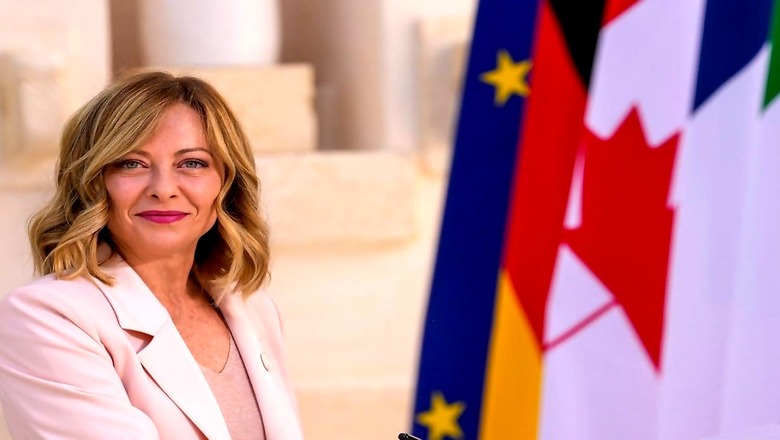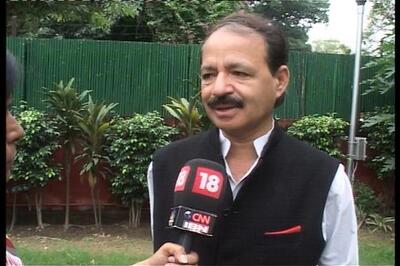
views
To many observers, Giorgia Meloni, Italy’s first female prime minister, holds the key to the future of the EU. This so-called “far-right” leader represents the rise of the right, especially in western Europe where left-wing or moderate leaders have ruled the roost for quite some time. Her anti-establishment aura struck a chord with her younger constituents, while her traditionalist right-wing credentials made her appeal to the older voters in Italy.
June has been a happening month for Meloni. First, it was the results of the EU parliamentary elections that threw a shocker. Then, there was the G7 Summit in Italy. And finally, a private dinner in Brussels that ended in bad blood. And if there’s a star of the show here, it’s Giorgia Meloni.
At the G7 Summit, Meloni was the only leader among the seven who did not have low approval ratings. From Joe Biden and Rishi Sunak to Olaf Scholz, Emmanuel Macron, and Justin Trudeau, all G7 leaders are facing fears of being voted out of power in the next elections. With such power come political enemies, and for Meloni, that is the case. And she is not letting up easy— just ask Macron, her staunch political rival with whom she has sparred several times. She did not shy away from accusing him of electioneering at the summit when he pushed for the mention of abortion rights in the joint declaration, against Meloni’s wishes.
Then it was the sensational dinner story. After the G7 summit, European leaders went back to the drawing board as the election results earlier this month had given a boost to the right and left the future of Ursula von der Leyen as President of the European Commission hanging in the balance. Tensions rose when it was revealed that a pre-dinner meeting took place among leaders from the EU’s three largest political parties, excluding Italy PM Giorgia Meloni’s ECR group. This was a clear attempt to sideline her and she did not take to it kindly. Meloni reportedly confronted Macron, Scholz, Donald Tusk, and the prime ministers of the Netherlands, Greece, and Spain for excluding her while making a deal to present to the rest of the EU. She told reporters, “We will not accept a pre-packaged agreement.”
In fact, reports say that Meloni was said to have been “going nuts” as she “spent hours waiting while the other three parties tried to force a deal by saying they didn’t need her”. The wait was about three hours. Dinner was late and so was basic courtesy as far as Meloni’s rivals are concerned. The meeting ended with no deal and a lesson— they need Meloni and they need her now.
In the recent EU parliamentary elections, which included 720 seats in 2024, Meloni has emerged as a potential kingmaker. Her group, the ECR, has edged out Macron’s Renew group to take third place. Both German Chancellor Olaf Scholz’s Socialists and Democrats group and France’s Macron’s Renew group received a drubbing in the EU parliamentary elections and the leftist Green Parties saw an even greater decline in their fortunes, leaving the largest group and political ally, Ursula von Der Leyen’s EPP, looking outward towards Meloni’s ECR. The right witnessed growth across Europe with Meloni’s party securing a big win with about 28% of the total votes. Meanwhile, France’s Marine Le Pen’s party overshadowed Macron, triggering him to declare a snap election— almost daring the French to elect a far-right leader or strengthen his hand against her. Le Pen now wants Meloni to come and join her group at the EU level — in a sort of right-wing coalition that would potentially dominate the Union.
Hungary’s Victor Orban sees this as a golden opportunity and has been urging the two leaders to join forces. He criticised the leaders of Italy’s and France’s far-right parties on Friday for failing to form an alliance for the next European Parliament. He predicts that such a coalition, if joined by other right-wing MEPs, could become the largest parliamentary faction in Europe. Orban lamented, “We used to dream about this, and then we wake up and it turns out that the two ladies cannot come to an agreement.”
But Meloni is keeping her cards close to her chest and may be open to a tie-up with the EPP after all. And such is the nature of Meloni’s politics. She is a hard negotiator and gets what she wants.
In 2022, Giorgia Meloni stormed to power amid feverish calls for Italy to exit the EU and rein in illegal immigration through the country’s borders. Her anti-EU, anti-climate action, and anti-immigration stance spooked European political establishments, and in every news publication, she was painted in an alarmist light as a far-right leader who drew her inspiration from Mussolini and his Republican Fascist Party. After all, in her teens, she was part of a now dissolved Neo-fascistic movement. And indeed, she is a friend of the ultra-right, making room for leaders who may have a soft side for Mussolini in her government. But she has come a long way from being tagged as a political pariah to a fan favourite in Europe. Today, Meloni is the key piece of the puzzle in European politics.
No one had seen this coming, as up until a few years ago, Italy was being led by left-leaning leaders and the right had for long been pushed to a corner. In 2018, Giorgia Meloni’s Brothers of Italy party had secured only 4% of the vote. But a massive turnaround took place following the Covid pandemic when Italy’s economy came close to a crash and the people’s faith in the EU began to fade.
If someone had told you just a few years ago that there would be a leadership in Italy that would be anti-EU, anti-immigration, anti-climate action, and all for Christian values, you would not have believed them. Italy’s poor fiscal state including an alarming debt problem had been gripping the country when the pandemic hit and brought its economy on its knees. Then, Russia invaded Ukraine, which was followed by all-out sanctions against Moscow and a crippling energy crisis in the continent. Each of these issues had dug its heels when Meloni stepped in. She pushed for better fiscal management, struck energy deals diversifying away from Russia, and bolstered the Italian economy by shielding its small and medium-sized businesses from expensive climate commitments. The result was that Italy’s economic recovery has been much better than its peers in western Europe.
The surprise from her end was the way she embraced the EU and even NATO after coming to power. Rather than breaking away from the EU, she has been driving desired change from within. She has engaged with Ursula von der Leyen on immigration, including travelling with her to crack deals with Tunisia and Egypt to curb migration to Europe. Moreover, her push for protecting “Christian values” is finding resonance across Europe. She’s campaigning against the EU’s green agenda, and that has worked for her as she’s turned into a darling of the farmers and the industrial sector in her country.
It is this strategic play that has placed her in high demand. With Europe facing a leadership crisis from France and Germany, Italy’s Meloni is emerging as a formidable and effective voice of the right, making it difficult to envision Europe’s future without her. At the age of 47, she is just beginning what is likely to be a long political career.



















Comments
0 comment